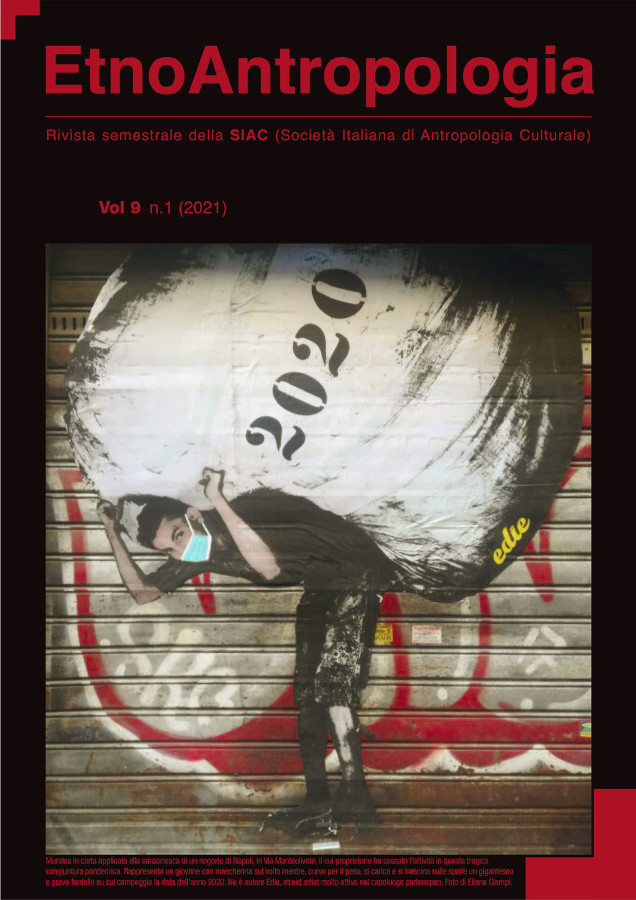Afterword. Vertiginous life and the Inconstancy of Becoming in the Mediterranean
Parole chiave:
Crisis, Future, Solidarity, Temporality, Urgency.Abstract
The socio-historical nexus that is topologically interwoven throughout the Mediterranean region provides the background for a comparative framework for capturing the dizzying affects of precarious life in the 21st century. The conceptual triad of uncertainty, resilience, and futures is key to presenting life on the vertiginous “edge” as people tackle crises in Greece, Italy, Morocco, Portugal and Tunisia. Standing on the brink of time and of history-making, people face a decision of whether to cling by their fingernails to former lives, former Selves, or to take the plunge into the vortex of uncertain becoming. Here I argue that such world-changing moments should be contextualised through an acknowledgement of academic and historical lineages to better package so-called “unprecedented” events. More potently, I further propose that times of uncertainty influence how people orient to the future where a sense of urgency penetrates the normalised social fabric triggering a form of affective vertigo. In the whirlpool of unforeseen social change, people experience confusion as to where and when they belong on timelines of previously unquestioned pasts and futures, manifested as disorientation and dizziness where pathways to becoming have altered dramatically.
Riferimenti bibliografici
Albera D., Couroucli M. (eds.) 2012, Sharing Sacred Spaces in the Mediterranean: Christians, Muslims and Jews at Shrines and Sanctuaries, Bloomington: Indiana University Press.
Bowman G. (ed.) 2012, Sharing the sacra: the politics and pragmatics of inter‐communal relations around holy places, New York: Berghahn.
Cappelletto F. 2003, Long-term memory of extreme events: from autobiography to history, «Journal of the Royal Anthropological Institute», 9 (2): 241-260.
Davey R. 2020, Snakes and ladders: legal coercion, housing precarity, and home‐making aspirations in southern England, «Journal of the Royal Anthropological Institute», 26 (1): 12-29.
de Martino E. 2012 [1956], Crisis of Presence and Religious Reintegration, Prefaced and Translated by Farnetti T. and Stewart C., «HAU: Journal of Ethnographic Theory», 2 (2): 431-450.
Fassin D., Rechtman R. 2009, The Empire of Trauma: An Inquiry into the Condition of Victimhood, Princeton: Princeton University Press.
Henig D. 2014, Contested Choreographies of Sacred Spaces in Muslim Bosnia, in Barkey K., Barkan E. (eds.) 2014, Choreography of Sacred Space: State, Religion and Conflict Resolution, New York: Columbia University Press, 130-160.
Barkan E. 2016, Crossing the Bosphorous: Connected Histories of “Other” Muslims in the Post-Imperial Borderlands of Southeast Europe, «Comparative Studies in Society and History», 58 (4): 908-934.
Knight D. M. 2018, The Desire for Disinheritance in Austerity Greece, «Focaal», 80: 30-42.
Knight D. M. 2019, Time of Crisis: Permanence as Orientation. American Ethnologist website, March 8. http://americanethnologist.org/features/collections/orientations-to-the-future/time-of-crisis-permanence-as-orientation.
Knight D. M. 2021, Vertiginous Life: An Anthropology of Time and the Unforeseen, New York: Berghahn.
Muehlebach A, 2012, The Moral Neoliberal: Welfare and Citizenship in Italy, Chicago: University of Chicago Press.
Pipyrou S. 2016, The Grecanici of Southern Italy: Governance, Violence, and Minority Politics, Philadelphia: University of Pennsylvania Press.
Rapport N. 2018, Loving recognition: a proposal for the practical efficacy of love as a public virtue, «Journal of the Royal Anthropological Institute», 24 (1): 126-144.
Runia E. 2010, Into Cleanness Leaping: The Vertiginous Urge to Commit History, «History and Theory: Studies in the Philosophy of History», 49 (1): 1-20.
Sabaté I. 2016, The Spanish Mortgage Crisis and the Re-emergence of Moral Economies in Uncertain Times, «History and Anthropology», 27 (1): 107-120.
Serres M. 1995, Genesis, Ann Arbor: University of Michigan Press.
Tuckett A. 2018, Rules, Paper, Status Migrants and Precarious Bureaucracy in Contemporary Italy, Stanford: Stanford University Press.
Wilde M. 2017, Embryonic alternatives amid London's housing crisis, «Anthropology Today», 33 (5): 16-19.
##submission.downloads##
Pubblicato
Come citare
Fascicolo
Sezione
Licenza
Copyright (c) 2021 Daniel M. Knight

TQuesto lavoro è fornito con la licenza Creative Commons Attribuzione 4.0 Internazionale.
Gli autori mantengono i diritti sulla loro opera e cedono alla rivista il diritto di prima pubblicazione dell'opera, contemporaneamente licenziata sotto una Licenza Creative Commons - Attribuzione che permette ad altri di condividere l'opera indicando la paternità intellettuale e la prima pubblicazione su questa rivista.
Gli autori possono diffondere la loro opera online (es. in repository istituzionali o nel loro sito web) prima e durante il processo di submission, poiché può portare a scambi produttivi e aumentare le citazioni dell'opera pubblicata (Vedi The Effect of Open Access).





